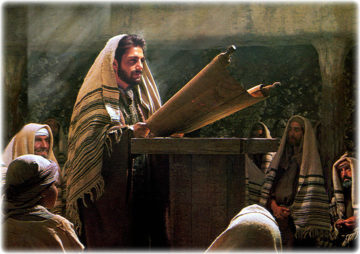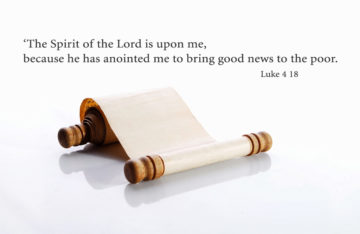For the Third Sunday of Ordinary Time Franciscan Friar Fr. Paul Gallagher offers us these Gospel Reflections. The content is edited by Franciscan Sister of Christian Charity Sister Anne Marie Lom and Joe Thiel. The excerpts from the Sunday readings are prepared by Joe Thiel. To read or download the complete pdf with excerpts for your prayer, please click here: Franciscan Gospel Reflection January 23 2022. Excerpts are from the Lectionary for Mass for Use in the Dioceses of the United States of America, second typical edition © 2001, 1998, 1997, 1986, 1970 Confraternity of Christian Doctrine, Inc., Washington, DC. Used with permission. All rights reserved. No portion of this text may be reproduced by any means without permission in writing from the copyright owner.
Luke 1:1-4, & 4:14-21
Since many have undertaken to compile a narrative of the events that have been fulfilled among us, just as those who were eyewitnesses from the beginning and ministers of the word have handed them down to us, I too have decided, after investigating everything accurately anew, to write it down in an orderly sequence for you, most excellent Theophilus, so that you may realize the certainty of the teachings you have received.
Jesus returned to Galilee in the power of the Spirit, and news of him spread throughout the whole region. He taught in their synagogues and was praised by all.
He came to Nazareth, where he had grown up, and went according to his custom into the synagogue on the Sabbath day. He stood up to read and was handed a scroll of the prophet Isaiah. He unrolled the scroll and found the passage where it was written: “The Spirit of the Lord is upon me, because he has anointed me to bring glad tidings to the poor. He has sent me to proclaim liberty to captives and recovery of sight to the blind, to let the oppressed go free, and to proclaim a year acceptable to the Lord.” Rolling up the scroll, he handed it back to the attendant and sat down, and the eyes of all in the synagogue looked intently at him. He said to them, “Today this scripture passage is fulfilled in your hearing.”
Background:
The first verses of Luke’s gospel acknowledge that others’ gospels have been written, and state what Luke intends to accomplish by writing his gospel. He is going to write an orderly narrative, a historical work, at least as he understands it in his day. He also says that he is going back to what has been handed down to us through the eyewitnesses and the ministers of the Word. He does not include himself in either of these two groups, indicating that he himself is not a witness to the events he is recording. His gospel has been written for an individual, Theophilus. Therefore, Luke’s first intention in writing may not be for it to be used by the Christian community as they gather for prayer or to celebrate the Lord’s Supper. Its purpose is to reassure Theophilus that what has been taught about Jesus is accurate and reliable. However, Luke may be aware that Theophilus may share his gospel with other Christians at these events.
After this introduction, the gospel text for this Sunday skips over the section of Luke that describes the announcement of Jesus’ birth, finding the boy Jesus in the temple, the ministry of John the Baptist, Jesus’ own baptism, and the temptations of Jesus in the desert. Among the part of Luke’s gospel that is reserved for other Sundays are the two canticles that are part of the Church’s daily prayer in the liturgy of the hours, The Canticles of Mary and of Zechariah.
Today’s gospel text then returns to Luke where he gives a single-sentence summary of Jesus’ public ministry in Galilee. In contrast to the success in Galilee, Luke describes Jesus’ presence in his home town of Nazareth, where he is among his family and relatives — the people with whom Jesus has lived much of his life – from the time he was an infant, through his youth and all of his adult life until his own baptism and taking on a public life. Here he enters his home synagogue of Nazareth and unrolls the scroll containing the prophet Isaiah, and reads from the prophet and gives his teaching. Jesus makes the bold proclamation that today in Nazareth, in this synagogue, this passage from Isaiah is being fulfilled. The passage that Jesus reads proclaims that the poor, the captives, the blind, and the oppressed are finding deliverance.
Luke’s gospel will present a Jesus who is present to those in his society who were forgotten and overlooked by the religious leaders of the day. Throughout Luke’s gospel there is a sense that Jesus is acting under the power of the Spirit of God. That is evident in how Jesus has returned to Nazareth and read and taught in his hometown synagogue as well.
Reflection Questions:
- Have you ever tried to share your belief in Jesus with another? Where did you begin your explanation?
- What strikes you most in Luke’s opening statement of his intention in writing a gospel? What feelings arise within you as you hear Luke’s intention?
- How are you and the Christian community better off because of Luke’s effort to write another gospel in addition to the ones that already existed at the time he was writing?
- Does the fact that Luke took the time to write his gospel even though others existed at his time suggest anything to you?
- Imagine that you are among those gathered that day in Jesus’ hometown synagogue. What is going through you as Jesus motions for the scroll and begins to read?
- Jesus deliberately finds and reads a portion of the prophet Isaiah that says: “The Spirit of the Lord is upon me, because he has anointed me to bring glad tidings to the poor…” What goes through you as you hear Jesus read this passage from Isaiah?
- What is in your heart as Jesus states that this passage is being fulfilled in your hearing?
- Can you talk with God now about what Jesus did that day in his hometown synagogue, the significance of what he did for you, or anything that arose within you as you encountered this gospel today?


